Emil Poppr
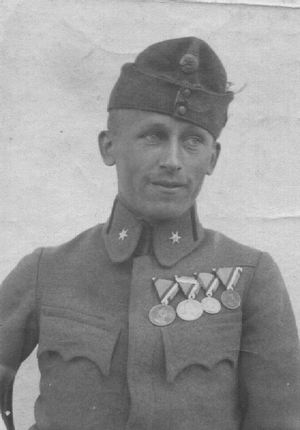 Emil
Poppr was born in 1896 in the Győr (Raab) area of Hungary as the son of a
senior forestry official and had himself planned to enter the forestry service.
With the outbreak of the First World War however, Poppr reported voluntarily for
service with the Austro-Hungarian army as a Kadett-Aspirant in the Depot
Battalion of infantry regiment number 83 and completed his one year volunteer's training
before being posted in November 1915 to the regiment in the field then fighting
in Galicia. The dashing Kadett soon found himself attached to the assault
company of his regiment.
Emil
Poppr was born in 1896 in the Győr (Raab) area of Hungary as the son of a
senior forestry official and had himself planned to enter the forestry service.
With the outbreak of the First World War however, Poppr reported voluntarily for
service with the Austro-Hungarian army as a Kadett-Aspirant in the Depot
Battalion of infantry regiment number 83 and completed his one year volunteer's training
before being posted in November 1915 to the regiment in the field then fighting
in Galicia. The dashing Kadett soon found himself attached to the assault
company of his regiment.
Kadett in der Reserve Poppr constantly volunteered himself for
dangerous missions, no enterprise appeared too difficult and no task was impracticable.
In only six months he was awarded the Bronze, the Silver Bravery Medals in both
classes and the Golden Bravery Medal.
Risky patrol engagements and nocturnal assault operations were
repeatedly executed with great success. As an example can be found his citation
for the award of the Golden Bravery Medal:
"had attacked during the night of the 11th/12th of April
1916 southeast of Nowi Aleksiniec under the most dangerous conditions a Russian
standing patrol and had personally captured one man and shot down another two
when he had alone jumped into an hollow occupied by five men. His sudden sally
was so rapid that his own men were still twenty paces behind him had proved a
success which produced the first authenticated and reliable information about
the presence of a new Russian formation in this sector. He volunteers for such
operations repeatedly, effecting a fascinating influence on his subordinates,
outstandingly brave, tireless to every danger and already decorated for a
similar enterprise."
After
this Emil Poppr was promoted to Fähnrich in der Reserve but his love of such
operations did not desert him. In the summer he received for the 2nd time the
Silver Bravery Medal 1st Class and on the 4th of October 1916 accomplished a
deed which known as the "counterattack at Batków"
was the first of two operations which would finally be used as citations by the
chapter of the Military Maria Theresian Order.
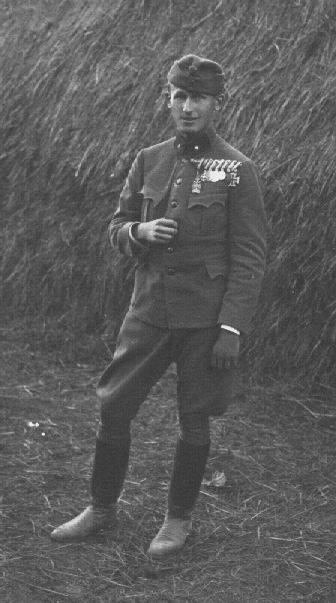 The
action at Batków was described as follows: "In the autumn of 1916 under
the auspices of the 2nd army infantry regiment 83 was situated in the
strengthened positions between Batków and Zwyzyn about 22 kilometres east of
Zloczów in Galicia. When in the first days of October after strong artillery
preparation yet another great attack of Brussilow developed, the regimantal
headquarters ordered the concentration in the forward most lines by individual
companies to which of one them Fähnrich in der Reserve Poppr belonged. However
with the rider that he should not participate in the forthcoming action he was
to report to battalion headquarters. This order was based on an instruction from
the supreme command that holders of the Golden Bravery Medal were to be
withdrawn from the immediate area of danger in order to remain available for
further duty with their troops.
The
action at Batków was described as follows: "In the autumn of 1916 under
the auspices of the 2nd army infantry regiment 83 was situated in the
strengthened positions between Batków and Zwyzyn about 22 kilometres east of
Zloczów in Galicia. When in the first days of October after strong artillery
preparation yet another great attack of Brussilow developed, the regimantal
headquarters ordered the concentration in the forward most lines by individual
companies to which of one them Fähnrich in der Reserve Poppr belonged. However
with the rider that he should not participate in the forthcoming action he was
to report to battalion headquarters. This order was based on an instruction from
the supreme command that holders of the Golden Bravery Medal were to be
withdrawn from the immediate area of danger in order to remain available for
further duty with their troops.
Poppr
only obeyed reluctantly. He was already on his way to the rear on the afternoon
of the 4th of October when the masses of Russian infantry succeeded to
breakthrough on both flanks of the IV battalion of infantry regiment 83 and as a
result the companies in the centre were compelled to abandon their sector. The
battalion headquarters deprived of all telephone communications found themselves
further to the rear in a small shelter whose entry was blocked by enemy
artillery fire.
In
this extremely critical situation, Fähnrich Poppr imposed his authority over
the retreating components of the various companies and quickly occupied the edge
of the wood between the first and second defence lines and with about 80 to 90
men opened heavy rapid fire on the assaulting Russians and immediately went over
onto the counter-attack in which the enemy gave way under pressure and had to
leave behind many dead, wounded and prisoners.
Through
this partial success the entire enemy attack was brought to a standstill; the
lost positions could be retaken, the divisional front and that of the two
neighboring sectors could also be maintained."
With
effect from the 1st of November 1916 Fähnnrich Poppr was granted accelerated
promotion to Leutnant in der Reserve on account of his brave conduct before the
enemy.
When following the death of Kaiser Franz Joseph I and Kaiser
Karl I ascended to the throne on the 21st of November 1916, the leading circles
in Hungary demanded a speedy coronation in Budapest. The decision of Kaiser Karl
to have himself crowned Apostolic King of Hungary took place within a few days
of his accession and the date of the 30th of December was shortly set which
faced the competent court authorities with great organizational and protocol
problems.
In accordance with the old coronation ceremony, this time in a
great hurry, persons of Hungarian nationality where chosen who were deemed
worthy in accordance with tradition of becoming Knights of the Golden Sporn
(spur) at the coronation. An exact determination of the selection criteria is no
longer today available due to the lack of complete records. The composition of
these 51 persons shows however that nearly half of those chosen were descendents
of old Hungarian noble families - names like Teleki,
Andrássy, Esterházy and Festetics speak for themselves. Of the
remainder they were divided into almost equal groups of either the new
influential political nobility like Wekerle,
Hazai or Tisza or of the so called "courageous nobility" among whose
members numbered the Lieutenants Ladislaus Barcsay, Zoltán Vén and naturally
Emil Poppr. The officers of the latter group had already been repeatedly
decorated for bravery before the enemy; nearly all had already been awarded the
Golden Bravery Medal whilst in the rank of Fähnrich.
Altogether
the service records of some 51 young officers were requested in the strictest confidentiality
which apart from one case (Leutnant Paul
von Leidenfrost was undergoing at that time an investigation by a court of
honour which later however found
in his favour) were found to be positive and so the remaining 50 officers and
officer aspirants were summoned to the coronation in Budapest. They were granted
leave from Christmas until the conclusion of the coronation ceremonies and had
to appear in field service dress at the solemn knighting ceremony although
eventually only 47 managed to attend due to the exigencies of the war and the
very short time span between being designated and the actual ceremony.
Leutnant
Nikolaus Jurkovic und Oberleutnant Dionys Kovács simply arrived too late in
Budapest and Leutnant Ladislaus Barcsay lay in a field hospital at the time of
the coronation.
Since
time immemorial there had been the desire for an outward and portable sign
for the knights of the Golden Sporn which had been awarded by each respectively
newly crowned king and finally this time it seems, although with some delay this
was again implemented. They argued for more than a year over the appearance and
financing of the new badge. Nevertheless on the 5th of April 1918, the foreign
minister Graf Czernin placed before the Kaiser the appropriate statutes and
regulations for wear, which he approved on the 10th of April 1918. Two Imperial
decrees were written stating that this was not in itself an order but in fact it
should be treated as an historical act of the King's crowning in Hungary and
that the decoration was only to be worn at the throat and in no other manner.
When and in what form the recipients were awarded the commemorative decoration
is unfortunately not known, it did however apparently transpire before the war's
end. The decoration from Emil Poppr's estate, which along with his knight's
cross of the Military Maria Theresian Order are in a private collection in
Austria and are shown below.
By
the winter of 1916/17 Emil Poppr was the most decorated Hungarian junior officer
in the k.u.k. army and his superiors were under pressure to ensure that he was
now kept away from immediate danger so that his experience and qualities would
be preserved for the army. However the life in the rear area was not for Poppr.
Repeatedly he attempted to be moved forward to the front and this wish was eventually
granted in the Spring of 1917 and immediately on his return he again
participated in the death defying patrol actions which he did so well. Within a
very short period he would be decorated with the Military Merit Cross 3rd Class
and the Order of the Iron Crown 3rd Class both naturally with the War Decoration
and Swords. Here is a short quote from one of his citations: "During the
successful operations carried out by him on the 27th and 28th of March 1917 in
the vicinity of Batków, he broke through the six rows of enemy obstacles,
rushed into the position and wiped out the greater part of the garrison and
returned taking along a prisoner, a complete machine gun and seven rifles with
very slight losses to our own forces".
As
the resolute leader of the assault company of infantry regiment 83 he was
awarded the Iron Cross 2nd Class by the German allies. However on instructions
from corps headquarters Poppr was again reined in. He was only to be employed
for really important missions. The divisional headquarters decided on such a
mission in the summer of 1917 as it was necessary to bring in a prisoner so that
finally the composition of the enemy reinforcements could be ascertained.
Naturally enough Poppr freely volunteered to undertake this mission and this
operation would be known as the "Assault troop operation at Batków"
as the second and decisive action by which the chapter of the Military Maria
Theresien Order would decide on Poppr's award of that decoration.
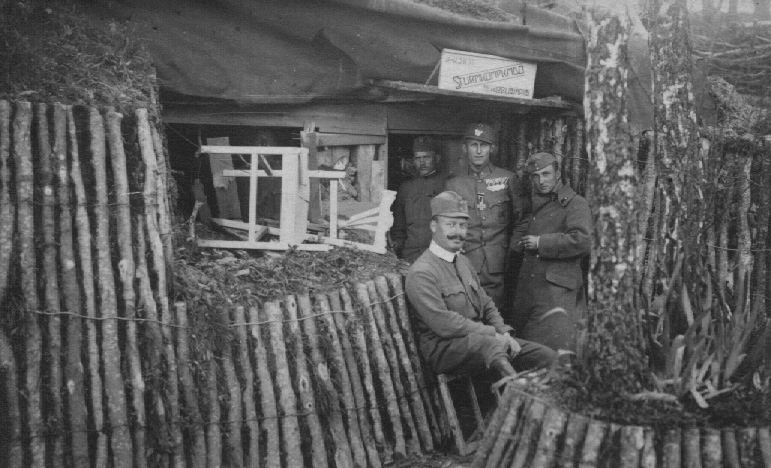 Here
is the citation: "Poppr assembled an assault troop of 35 men and had
a strong wooden framework made on which 150 hand grenades were suspended and the
fuses prepared. This frame was then successfully moved during the night of the
4th of July 1917 into the thick Russian wire and by the explosion a breach 100
metres wide and 12 metres deep was created through which Poppr and his men
assaulted forward and penetrated into the hostile main enemy position and rolled
it up to a company's width.
Here
is the citation: "Poppr assembled an assault troop of 35 men and had
a strong wooden framework made on which 150 hand grenades were suspended and the
fuses prepared. This frame was then successfully moved during the night of the
4th of July 1917 into the thick Russian wire and by the explosion a breach 100
metres wide and 12 metres deep was created through which Poppr and his men
assaulted forward and penetrated into the hostile main enemy position and rolled
it up to a company's width.
After an hours fighting with hand grenades, bayonets and rifle
butts the bold assault troop withdrew without loss but with numerous prisoners
and by their interrogation made it possible for the divisional command to make
very important assessments regarding enemy strengths and attack intentions. This
was of decisive significance for the successful defence against the next
offensive."
For these two actions Leutnant in der Reserve Emil Poppr was
awarded the Knights' Cross of the Military Maria Theresien Order by the Order's
Chapter in the 189th promotion on the 27th June 1922.
It now finally became clear to the high command that the life
and experience of this daring officer must be preserved and in the autumn of
1917 he was transferred to the replacement battalion and remained there until
the war's end involved in the training of assault troops.
After the collapse he returned to the comitate of Moson in
Hungary and entered the state forestry service for which he had already striven
before the outbreak of the war. He died on the 6th of March 1928 as the
consequence of a road traffic accident while involved in his forestry work at
Lébény. So died at the early of age of just 32 years one of the bravest
Hungarian officers, one could almost say "against his own will" - only
through the orders of his superiors had he survived the up to then bloodiest war
to die of this totally normal civilian misfortune.
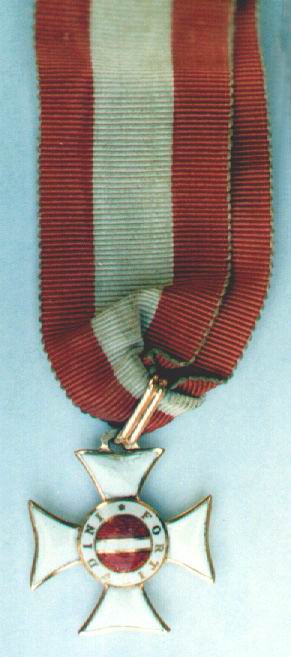 |
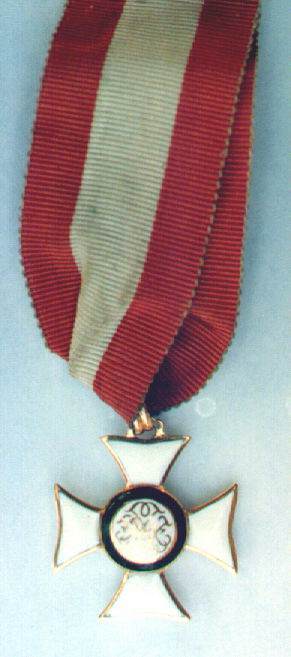 |
| Poppr's MMThO - Obverse |
Poppr's MMThO - Reverse |
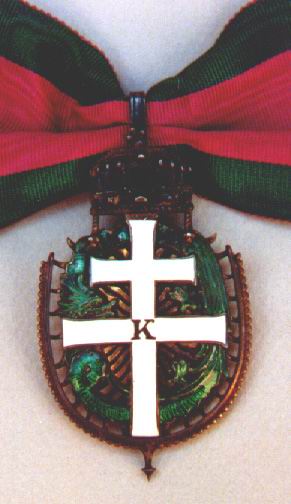 |
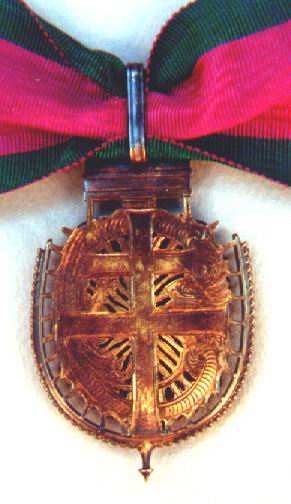 |
| Poppr's Golden Spur- Obverse |
Poppr's Golden Spur - Reverse |
Back to Miscellaneous Biographies

 Emil
Poppr was born in 1896 in the Győr (Raab) area of Hungary as the son of a
senior forestry official and had himself planned to enter the forestry service.
With the outbreak of the First World War however, Poppr reported voluntarily for
service with the Austro-Hungarian army as a Kadett-Aspirant in the Depot
Battalion of infantry regiment number 83 and completed his one year volunteer's training
before being posted in November 1915 to the regiment in the field then fighting
in Galicia. The dashing Kadett soon found himself attached to the assault
company of his regiment.
Emil
Poppr was born in 1896 in the Győr (Raab) area of Hungary as the son of a
senior forestry official and had himself planned to enter the forestry service.
With the outbreak of the First World War however, Poppr reported voluntarily for
service with the Austro-Hungarian army as a Kadett-Aspirant in the Depot
Battalion of infantry regiment number 83 and completed his one year volunteer's training
before being posted in November 1915 to the regiment in the field then fighting
in Galicia. The dashing Kadett soon found himself attached to the assault
company of his regiment.  The
action at Batków was described as follows: "In the autumn of 1916 under
the auspices of the 2nd army infantry regiment 83 was situated in the
strengthened positions between Batków and Zwyzyn about 22 kilometres east of
Zloczów in Galicia. When in the first days of October after strong artillery
preparation yet another great attack of Brussilow developed, the regimantal
headquarters ordered the concentration in the forward most lines by individual
companies to which of one them Fähnrich in der Reserve Poppr belonged. However
with the rider that he should not participate in the forthcoming action he was
to report to battalion headquarters. This order was based on an instruction from
the supreme command that holders of the Golden Bravery Medal were to be
withdrawn from the immediate area of danger in order to remain available for
further duty with their troops.
The
action at Batków was described as follows: "In the autumn of 1916 under
the auspices of the 2nd army infantry regiment 83 was situated in the
strengthened positions between Batków and Zwyzyn about 22 kilometres east of
Zloczów in Galicia. When in the first days of October after strong artillery
preparation yet another great attack of Brussilow developed, the regimantal
headquarters ordered the concentration in the forward most lines by individual
companies to which of one them Fähnrich in der Reserve Poppr belonged. However
with the rider that he should not participate in the forthcoming action he was
to report to battalion headquarters. This order was based on an instruction from
the supreme command that holders of the Golden Bravery Medal were to be
withdrawn from the immediate area of danger in order to remain available for
further duty with their troops. Here
is the citation: "Poppr assembled an assault troop of 35 men and had
a strong wooden framework made on which 150 hand grenades were suspended and the
fuses prepared. This frame was then successfully moved during the night of the
4th of July 1917 into the thick Russian wire and by the explosion a breach 100
metres wide and 12 metres deep was created through which Poppr and his men
assaulted forward and penetrated into the hostile main enemy position and rolled
it up to a company's width.
Here
is the citation: "Poppr assembled an assault troop of 35 men and had
a strong wooden framework made on which 150 hand grenades were suspended and the
fuses prepared. This frame was then successfully moved during the night of the
4th of July 1917 into the thick Russian wire and by the explosion a breach 100
metres wide and 12 metres deep was created through which Poppr and his men
assaulted forward and penetrated into the hostile main enemy position and rolled
it up to a company's width. 


